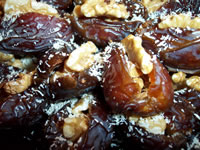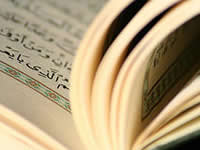 I had a date last night. No, it’s not what you think: Muslims customarily break their fast with a date. Dates have a special significance in Muslim culture and tradition. Referenced many times in the Qur’an, date palms are said to have sheltered and sustained Mary while she was giving birth to Jesus, and dates were a staple of the diet of the Prophet Muhammad and his companions.
I had a date last night. No, it’s not what you think: Muslims customarily break their fast with a date. Dates have a special significance in Muslim culture and tradition. Referenced many times in the Qur’an, date palms are said to have sheltered and sustained Mary while she was giving birth to Jesus, and dates were a staple of the diet of the Prophet Muhammad and his companions.
My date of choice is a Medjool date, large and plump, and I usually bring to potluck iftars a plate of Medjools stuffed with walnuts and sprinkled with powdered sugar. 90% of Medjool dates available in the US come from the fertile Coachella Valley of California, near where I grew up. In fact, southern California is one of the few areas outside the Middle East where dates are successfully cultivated. Dozens of varieties of dates are grown there. And in my humble opinion, they are the best dates in the world.
My father used to take me on pilgrimages to Mecca. Not the holy city in Saudi Arabia, but the town of Mecca, California, where the annual Date Festival is held. We got to sample every type of date available — Zahidi, Deglet Noor, Empress, and others. In this part of California, dates are not only celebrated–view the many roadside date shops and billboards along Interstate 10–but their links to the Arab and Muslim world are acknowledged respectfully. The date growers we met even asked us if they were pronouncing the Arabic names properly.
So how did my beloved Medjool date find a home in America? Back in the 1920s, disease threatened the very existence of Medjool dates in their native Morocco. In a desperate attempt to save the Medjool, the ruler of Morocco sent 11 young date palms to southern California, where they found a new home and prospered.
There is a lesson in those thriving date farms of California that can be applied to the Muslim American experience. Like those dates, Muslims have also thrived in American soil–we constitute one of the highest per-capita income communities in the US, and we have become relatively well integrated into American society (at least in comparision with other Muslim-minority countries).
And rather than losing our religion in the American melting pot, our faith has blossomed as well. Native-born and educated US scholars, steeped in both traditional Islam and American creative thinking, are being re-exported to the Muslim world. Scholars from the US may be the key to resolving the post-modern identity crisis that afflicts too many Muslim societies.
Just something to chew on the next time you eat a date.

